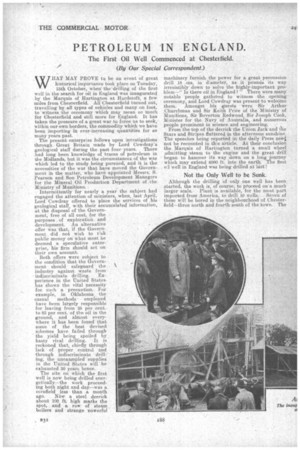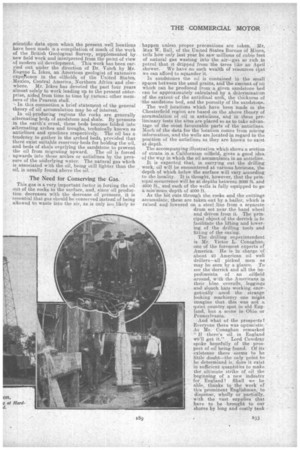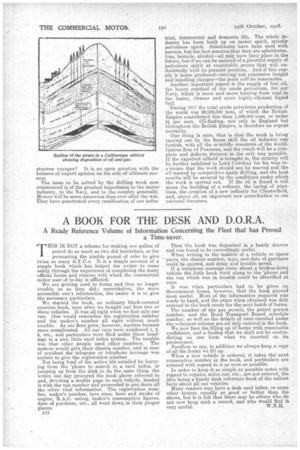PETROLEUM IN ENGLAND.
Page 12

Page 13

Page 14

If you've noticed an error in this article please click here to report it so we can fix it.
The First Oil Well Commenced at Chesteifield.
(By Our Special Correspondent.)
WHAT MAY PROVE to be an event of great historical importance took place on Tuesday, 15th October, when the drilli,ng of the first well in the search for oil in England was inaugurated by the Marquis of Hartington at Hardstoft, a few miles from Chesterfield. All' Chesterfield turned out, travelling by all types of vehicles and many on foot, to 'witness the ceremony which may mean so much for Chesterfield and still more for England. It has taken the pressure of a great war to ioree us to seek,' within our own borders, the commodity which we have been importing in ever-increasing quantities for so many years past.
The present enterprise follows upon investigations through Great Britain made by Lord Cowdray's geological staff during the past four years. There had long been knowledge of traces of petroleum in the Midlands, but it was the circumstances of the war which led to the study being pursued, and it is the necessities of the war that have moved the Government in the matter, who have appointed Messrs. S. Pearson and Son Petroleum Development Managers for the Mineral Oil Production Department of the Ministry of Munitions. . • Intermittently for nearly a year the subject had engaged the attention of ministers, when, last April, Lord Cowdray offered to place the services of his geological staff, with their accumulated information, at the disposal of the Government, free of all cost, for the purposes . of exploration and development. An alternative offer was that, if the Government did not wish to risk public money on what must be deemed a speculative enterprise, his firm should act on their own account.
• Both offers were subject to the condition that the Government should safeguard the industry against waste from
indiscriminate drilling. Experience in the United States has shown the vital necessity for such a precaution. For example, in Oklahoma , the casual methods employed have been latgely responsible for leaving from '25 per cent.to85 per cent. of the oil in the ground, and almost everywhere it has been found that some of the best devised schemes have failed through the yield being spoiled by hasty rival drilling. It is reckoned that, chiefly through lack of proper control and through indiscriminate drilling, the unexampled supplies in the United States will be exhausted 30 years hence.
The site on which the first well is now being drilled energetically--the work proceeding both night and day—was a cornfield less than a month ago. Now a steel derrick about 100 ft. high marks the spot, anda row of steam boilers and strange powerful
„.
machinery furnish the power for a great percussion drill 18 ins. in cEameter, as it pounds its way irresistibly down to solve the highly-important problem—" Is there oil in England? ' There were many notable people gathered to witness the opening ceremony, and Lord Cowdray was present to welcome them. Amongst his guests were • Sir Arthur ,Churchman and Sir Keith Price of the Ministry of Munitions, Sir Boverton Redwood, Sir Joseph Cook, Minister for the Navy of Australia, and numerous people prominent in science and engineering.
From the top of the derrick the Union Jack and he Stars and Stripes fluttered in the afternoon sunshine. The speeches being reported in the daily Press need not be recounted in this article. At their conclusion the Marquis of Hartington turned a small wheel admitting steam to the engine and the great drill began to hammer its way down on a long journey which may extend 4 000 ft. into the earth. The first o:1 well in England was being drilled at last!
Not the Only Well to be Sunk.
Although the drilling of only one well has been started, the work is, of course, to proceed on a much larger scale.. Plant is available, for the most part imported from America, to drill 10 wells. Seven of these will be bored in the neighbourhood -of Chesterfield—three north and fourth south of the town. The scientific data upon which the present well locations have been made is a compilation of much of the work of the British Geological Survey, supplemented by new held work and interpreted from the point of view of modern oil development. This work has been carried out under the direction of Dr. Vetch by Mr. Eugene L. Ickes, an American geologist of extensive expthence in the oilfields of the United States, Mexico, Central America, Northern Africa and elsewhere. Mr. Ickes has devoted the past four years almost solely to work leading up to the present enterprise, aided from time to time by_yariouz, other members of the Pearson staff.
In this connection a brief statement of the general theory of oil accumulation may be of interest.
In oil-producing regions the rocks are generally alternating beds of sandstone and shale. By pressure in the earth's crust, these beds become folded into alternating arches and troughs, technically known as anticlines and synclines respectively. The oil has a tendency to gather in the arched beds, provided that there exist suitable reservoir beds for holding the oil, and beds of shale overlying the sandstone to prevent the oil from migrating upward. The oil is forced . upwards into these arches or anticlinea by the pressure of the underlying water. The natural gas which is associated with the oil, being. still lighter than the oil, is usually found above the oil.
The Need for Conserving the Gas.
This gas is a very important factor in forcing the oil out of the rocks to the surface, and, since oil production decreases with the decrease of pressure, it is essential that gas should be conserved instead of being ablowed to waste into the air, as is only too likely to happen unless proper precautions are taken. Mr.
Max W. Ball, of the United States Bureau of Mines, tells how only last"year he saw millions of cubic, feet
of natural gas wasting into the air—gas so rich in petrol that it dripped from the trees like an April shower. We have ,no such wealth of resources that we can afford to squander it.
In sandstones the oil is contained in the small spaces between the sand grains, and-the amount of oil
which can be produced from a given sandstone bed can be approximately calculated by a determination of the extent of the anticlinal arch, the thickness of the sandstone bed, and the porosity of the sandstone.
The well locations which have been made in the Chesterfield region are based on the above theory of accumulation of oil in anticlines, and in these pre. liminary tests the sites are placed so as to take advantage of the most favourable parts of the anticlines. Much of the data for the location comes from mining information, and the wells are located in regard to the position of the anticlines as they are known toexist at depth.
The accompanying illustration which shows a section of strata in a Californian oilfield, gives a good idea of the way in which the oil accumulates in an anticline. It is expected that, in carrying out the drilling work, oil will be encountered at various horizons, the depth of which below the surface will vary according to the locality. It is thought, however, that the prMcipal occurrence will be at depths between 2000 ft. and 4000 ft., and each of the wells is fully equipped to go a minimuin depth of 4000 ft. As the bit cuts through the rocks and the cuttings accumulate, these are taken out by a bailer, which is raised and lowered on a steel line from a separate drum set near the band wheel and driven from it. The prin cipal object of the derrick is to fa-cilitate the lifting and lowering of the drilling tools and fitting of the casing. The drilling superintendent is Mr. Victor L. Conaghan, one of the foremost experts of America. He is in charge of about 40 American oil well drillers—all picked men as may be seen by a glance. To see the derrick and all the im pedimenta of an oilfield around, with the Americans in their blue overalls, leggings and slouch hats working ener getically amid the strange looking machinery one might imagine that this was not a quiet country spot in old England, but a scene in Ohio or Pennsylvania. And what of the prospects? Everyone there was optimistic. As Mr. Conaghan remarked "If there's oil in England we'll get it." Lord Cowdray spoke hopefully of the pros pect of oil being found. Of its existence there seems to be little doubt—the only point to be determined is, does it exist in sufficient quantities to make the ultimate strike of oil the beginning of a new industry for England? Shall we he able, thanks to the work or this prominent Englishman, to dispense, wholly or partially, with the vast supplies that have to be brought to our shores by long and costly tank steamer voyages? It is an open question with the balance of expert opinion on the side of ultimate success.
The issue to be solved by the drilling work now commenced is of the greatest importance to the motor industry, to the Navy, and to the country generally. Motors will be more numerous than ever after the war. They have penetrated every ramification of our indus trial, 6ommercial and domestic life. The whole industry has been built up on motor spirit, Strictly petroleum Spirit. Substitutes have been used with success, but the fact remains that they are substitutes. Gas, benzole, alcohol—all may have their place in the future, but if we can be assured of a plentiful supply of petroleum spirit at reasonable prices that willundoubtedly hold its premier position. And if this supply is home produced—cutting out expensive freight and handling charges—the price win be reasonable.
Another important aspect is the supply of fuel oil, the heavy residual of the crude petroleum, for our Navy, which is more and • more turning from coal to the faster, cleaner and more highly-efficient liquid fuel.
'During 1917 the total crude petroleum production Of the world was 343,000,000 tons, of which the British Empire contributed less than 1,500,000 tons, or under 2:4 per cent. Oil-finding, not only in England but throughout the British Empire, is therefore an urgent necetsity.
One thing is sure' that is that the work is being carried out by the finest skill the oil industry can furnish, with all the scientific resources of the worldfamous firm of Pearsons, and the result will be a complete and definite decision in the only way possible. If the expected oilfield is brought in, the country will b'e further indebted to Lord Cowdray for his wise in, s'stence that the work should not be marred and the oil wasted by competitive hasty drilling, and the best results will be secured by the conditions under which the work is carried out. If the oil is found it will mean the -building of a refinery, the laying of pipelines, the creation of a new industry for Chesterfield, and, above all, an important new contribution to our national resources.






















